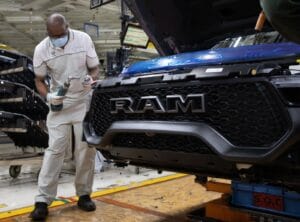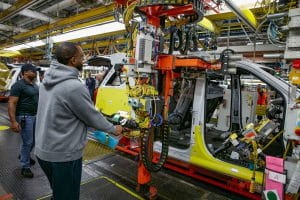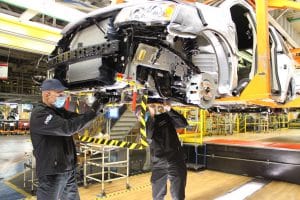
Factory workers are considered “essential,” which means auto workers employed by carmakers in the United States are now nearer to the front of the line for COVID-19 vaccine that experts hope will halt a lethal pandemic.
As it finalized plans for rolling out the first vaccines nationwide, the Center for Disease Control and Prevention issued guidelines for next group after healthcare workers and nursing home residents: essential workers.
Automakers said this week they are preparing for the arrivals of vaccines as they await further instructions from the CDC and state authorities overseeing the distribution of the critical injections.
(2020 will be a year for the record books — even if you’d prefer to forget it.)
“Pending Federal Drug Administration (FDA) approval, the Center for Disease Control has outlined recommendations for distribution, beginning in late 2020 with people in critical industries such as healthcare workers, expanding early next year to high-risk individuals such as the elderly and then having enough supply for the general population by next spring,” Ford spokeswoman Hannah Jolly said in an e-mail to TheDetroitBureau.com.

“Ford expects our employees will have access to vaccines once they become widely available. Distribution plans may vary depending on the country. Once the vaccine is available, it will not be required to return to Ford facilities. However, we will be encouraging all our employees to get the vaccine.”
Fiat Chrysler Automobiles N.V. assembled a cross-functional team, including medical professionals, that is studying the most effective approach to distributing vaccines to employees promptly when they become available, according to an FCA spokesperson.
GM spokesman David Caldwell noted that government agencies and health officials are planning vaccine distribution at the state and local levels. GM is in contact with those agencies and will communicate with employees as more information on distribution becomes available.
“We encourage employees to get vaccinated, and are planning to make them available,” Caldwell noted. “We’re not planning to mandate the vaccine.”
(Global auto sales expected to rebound next year — but may need til 2025 to reach pre-COVID levels.)
Detroit’s three automakers as well as manufacturers with extensive operation in the U.S., such as Toyota, Honda, Nissan, Tesla, Volkswagen, BMW and Mercedes-Benz, shut their factories in late March as COVID-19 began to spread across the U.S. Those plants began to resume operation in May and June, but the tempo of production was slowed by absenteeism and parts shortages created by the pandemic.

Automakers also revamped their factories to minimize contact between employees. On crowded assembly lines they placed plastic shields, now common in grocery stores and pharmacies, between the various workstations.
Workers also have been given wider latitude to miss work if they have been exposed to the virus carrying COVID-19 outside of work. “We don’t want to punish people for doing the right thing,” noted one United Auto Workers official.
Nonetheless, the co-workers have reported the deaths of several auto workers since last spring though all of them caught the virus outside of work, manufacturers have insisted. But absenteeism continues at a relatively high level and many workers have retired and temporary workers have been harder to find.
The CDC noted this week the Advisory Committee on Immunization Practices has classified the following non–healthcare essential workers as frontline workers, including firefighters and police officers, corrections officers, food and agricultural workers, U.S. Postal Service workers, manufacturing workers, grocery store workers, public transit workers, and those who work in the education as well as childcare workers.
The list was prepared with input from the U.S. Department of Homeland Security and the National Academies of Science, Engineering and Medicine for early vaccination and placed a priority on workers needed to continue to operate the economy but also work near others.
(Auto workers worried about returning to plants during pandemic.)
Certain factories, such as meat-packing plants, which experienced many infections in past months, will be given special priority in vaccine distribution but the automakers and the mechanics are auto dealerships are not far behind, according to experts responsible for vaccine distribution.







